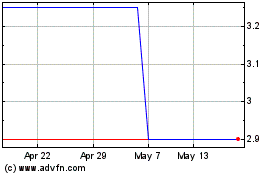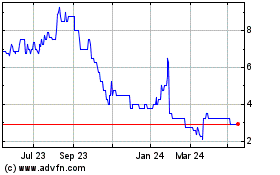Symphony Environmental Tech. PLC Introduction to d2w on the BBC World Service
30 January 2018 - 6:00PM
RNS Non-Regulatory
TIDMSYM
Symphony Environmental Tech. PLC
30 January 2018
30 January 2018
SYMPHONY ENVIRONMENTAL TECHNOLOGIES PLC
("Symphony")
Short film introducing d2w on the BBC World Service website
Symphony Environmental Technologies Plc are pleased to announce
the release on the Storyworks website of the BBC World Service of a
short film introducing d2w oxo-biodegradable (controlled-life)
plastic technology.
To view the film outside the UK, please click on the following
link.
http://www.bbc.com/storyworks/the-british-bid/symphony
or via Youtube or the Symphony Environmental website below:
https://www.youtube.com/watch?v=kQzT9E72fjQ&feature=youtu.be
http://www.symphonyenvironmental.com/d2w/d2w-brochure-5/
This film is timely given the fact that plastics are making
headlines for all the wrong reasons. Plastic litter is a serious
global problem not only causing a visual intrusion, but clogging
waterways and drains and harming wildlife. In the oceans
old-fashioned plastics are causing the death of thousands of marine
animals either by ingestion or entanglement. They are also
disintegrating into microplastics and entering the food chain. The
solution is to therefore stop using old-fashioned plastic and
upgrade it with d2w oxo-biodegradable plastic ("OBP") technology,
so that it will become biodegradable much more quickly. OBP is
proven science which has been studied, tested and commercially used
for more than 3 decades.
It is important to understand that these upgraded plastics do
not create microplastics. This is because the degradation process
is an entire change from hydrocarbon molecules to oxygen-containing
molecules which can be bioassimilated by bacteria and fungi which
are found everywhere on land and in the oceans. This point is
crucial to an understanding of OBP technology.
OBP plastic is fully consistent with the principles of Reduce,
Re-use, and Recycle, because (unlike bio-plastics) it can be
recycled. It has a useful service life where it is
indistinguishable from conventional plastics, but if it escapes
collection and ends up in the open environment as litter, it will
degrade and biodegrade in the same way as nature's wastes only
quicker and will leave no toxic residues and no microplastics.
Michael Laurier, CEO of Symphony said "We are delighted that the
BBC have allowed us this excellent opportunity to present a video
on their World Service platform. Our technology is gaining
increasing client and political recognition across the globe, and
we hope this will provide further exposure, establishing d2w as
part of the solution to plastic litter."
For further information, contact:
Contacts
Symphony Environmental Technologies
Plc
Michael Laurier, CEO Tel: +44 (0)
20 8207 5900
Ian Bristow, FD
Cantor Fitzgerald Europe
David Foreman (Corporate Finance) Tel: +44 (0)
20 7894 7000
Alex Pollen (Sales)
NOTES TO EDITORS:
About Symphony Environmental Technologies plc
Symphony has developed and continues to develop, controlled-life
plastic technology which helps tackle the problem of microplastics
by turning ordinary plastic at the end of its service-life into
biodegradable materials. It is then no longer a plastic and can be
bioassimilated in the open environment in the same way as a leaf.
The technology is branded d(2) w(R) and appears as a droplet logo
on many thousands of tonnes of plastic packaging and other plastic
products around the world. In some countries oxo-biodegradable
plastic is mandatory. For a video of d2w(R) plastic degrading see
https://www.youtube.com/watch?v=tQ7ce532BBM
In addition, Symphony has developed a range of additives,
concentrates and master-batches marketed under its d2p(R) brand,
which can be incorporated in a wide variety of plastic and
non-plastic products so as to give them protection against many
different types of bacteria, fungi, algae, moulds, insects and
fire.
Symphony has also developed the d(2) Detector(R), a portable
device which analyses plastics and detects counterfeit products.
This will be useful to government officials tasked with enforcing
legislation. Symphony's d(2) t tagging and tracer technology is
also available for further security.
Symphony has a diverse and growing customer-base and has
established itself as an international business with 74
distributors around the world. Products made with Symphony's
plastic technologies are now available in nearly 100 countries and
in many different product applications. Symphony is accredited to
ISO9001 and ISO14001.
Symphony is a member of The Oxo-biodegradable Plastics
Association (www.biodeg.org) (OPA), the Society for the Chemical
Industry (UK), and the Pacific Basin Environmental Council.
Symphony actively participates in the Committee work of the British
Standards Institute (BSI), the American Standards Organisation
(ASTM), the European Standards Organisation (CEN), and the
International Standards Organisation (ISO).
Further information on the Symphony Group can be found at
www.symphonyenvironmental.com.
This information is provided by RNS
The company news service from the London Stock Exchange
END
NRALLFVDLLIAFIT
(END) Dow Jones Newswires
January 30, 2018 02:00 ET (07:00 GMT)
Symphony Environmental T... (LSE:SYM)
Historical Stock Chart
From Apr 2024 to May 2024

Symphony Environmental T... (LSE:SYM)
Historical Stock Chart
From May 2023 to May 2024
